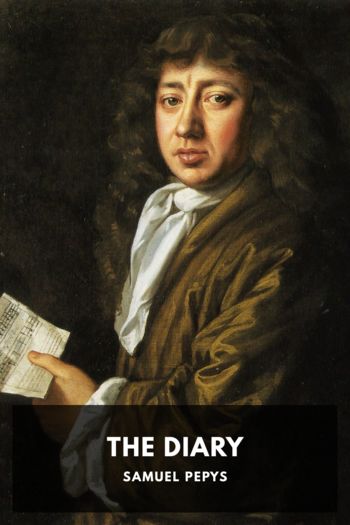The Diary, Samuel Pepys [e reader books TXT] 📗

- Author: Samuel Pepys
Book online «The Diary, Samuel Pepys [e reader books TXT] 📗». Author Samuel Pepys
In the “Bill against importing Cattle from Ireland and other parts beyond the Seas,” the Lords proposed to insert “Detriment and Mischief” in place of “Nuisance,” but the Commons stood to their word, and gained their way. The Lords finally consented that “Nuisance” should stand in the Bill. ↩
Professor Samuel R. Gardiner has kindly enabled the editor to identify this book. A copy of Ephemeris Parliamentaria, or a faithful Register of the Transactions in Parliament in the third and fourth years of the reign of our late sovereign lord King Charles. London, Printed for John Williams and Francis Eglesfield, 1654, is in the British Museum, and in the catalogue it is said to be edited by Thomas Fuller. A MS. note on the inside of the cover says that it was republished in 1657 under the title of The Sovereign’s Prerogative and the Subject’s Privilege. ↩
“Jan. 9. The Society meeting the first time in Arundel House, the president took notice again of the great favour, which Mr. Henry Howard of Norfolk had shown to the Society, not only in accommodating them with convenient room for their meetings, but also in presenting them with the library of the said house. The experiments appointed for the next meeting were (1) That of applying the strength of gunpowder to the bending of springs.”
Birch’s History of the Royal Society, vol. ii, pp. 138, 139↩
The Prince Royal, which bore the flag of Sir George Ayscu, Admiral of the White, grounded on the Galloper.
“Examination of George Purvis, master, and four other officers named, touching the surrender of their ship, the Prince, to the Dutch, on June 3, 1666; tending to prove that she was steering in according to orders when she ran aground; that Tromp brought a fireboat on each side to compel her to surrender, but that the flag was struck without the knowledge of the captain, Sir G[eorge] A[yscu], though one witness affirmed that he consented to its being struck. Jan. 10, 1667”
Calendar of State Papers, 1666–67, p. 445↩
Presented by Mr. Gauden; see July 28th, 1664. ↩
The work of Henry More the Platonist, entitled, An Antidote Against Atheisme, or an Appeal to the Natural Faculties of the Mind of Man, Whether There Be Not a God. London, 1653. Second edition, 1655. ↩
Anthony Lowther did not marry Margaret Penn until February (see 15th). The marriage licence is dated February 12th. ↩
See note 3163. ↩
The Indian Emperor, or the Conquest of Mexico by the Spaniards, Dryden, intended as a sequel to The Indian Queen. It was entered at Stationers’ Hall on May 26th, 1665, but not published until 1667. ↩
Captain Richard Kingdon (or Kingdom), Commissioner of Prizes and Governor of Excise. ↩
Dr. Edward Stillingfleet, Prebendary of St. Paul’s, 1672; Dean of St. Paul’s, 1678; and Bishop of Worcester, 1689. He died March 27th, 1699. His biographer sets down Cranborne, in Dorsetshire, and Ringwood, in Hampshire, as the sites of his schools. ↩
The preparatory school at Hertford was not founded until 1683. ↩
On this day “An Act for raising Money by a Poll and otherwise towards the maintenance of the present War,” and “An Act prohibiting the Importation of Cattle from Ireland and other parts beyond the Sea, and Fish taken by Foreigners,” were passed. The king complained of the insufficient supply, and said, “ ’Tis high time for you to make good your promises, and ’tis high time for you to be in the country” (Journals of the House of Lords, vol. xii, p. 81). ↩
See October 10th, 1666. ↩
See note 3130. ↩
Sir James Barkman Leyenberg, many years the Swedish Resident in this country. He is the person mentioned in the note to November 18th, 1660, as having in 1671 married the widow of Sir W. Batten (see note 796). —B. ↩
The ancient barony of De Ros, created by writ in 1264, was carried, with Belvoir Castle and other great possessions, into the family of Manners, by the marriage of Eleanor, sister and heir of Edmund, Lord de Ros (who died in 1508), to Sir Robert Manners. Katharine, only daughter and heir of Francis, sixth Earl of Rutland, married, first, George Villiers, Duke of Buckingham, and, secondly, Randal Macdonnal, Marquis of Antrim. On her death her son, the second Duke of Buckingham, became eighteenth Baron De Ros. He died without issue in 1687, and the barony remained in abeyance until the year 1806, when it was determined by the Crown in favour of Charlotte Boyle (Lady Henry Fitzgerald), who became third Baroness De Ros. The present Lord De Ros is the twenty-fourth baron. ↩
Sir William Montagu, second son of Edward, first Baron Montagu of Boughton, born about 1619, Attorney-General to the Queen, 1662 to 1676, when he was appointed Lord Chief Baron of the Exchequer. Removed by James II in 1686, and died August 20th, 1706. The Duke of Buckingham’s claim to the title of Lord Rosse was opposed by the Earl of Rutland. On January 31st “Mr. Montagu made a long argument to maintain the claim of the Earl of Rutland, and Mr. Solicitor made an answer on behalf of the claim of the Duke of Bucks” (Journals of the House of Lords, vol. xii, p. 97). ↩
Sir Peter Ball was Queen’s Attorney-General in 1662. ↩
Sir Heneage Finch, Solicitor-General, 1660–70. ↩
Sir William Scroggs, King’s Serjeant, 1669; Chief Justice of the King’s Bench, 1678–81. He died October 25th, 1683. ↩
The order





Comments (0)